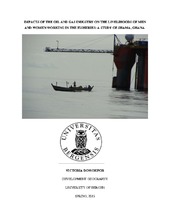Impacts of the oil and gas industry on the livelihoods of men and women working in the fisheries: a study of Shama, Ghana.
Master thesis
Permanent lenke
https://hdl.handle.net/1956/9939Utgivelsesdato
2015-05-14Metadata
Vis full innførselSamlinger
- Department of Geography [634]
Sammendrag
The discovery of oil and gas in Ghana in 2007 and subsequent production since 2010 have sparked high development and economic expectations in various sectors of the Ghanaian economy. The oil exploration and production may create changes in the predominant livelihood systems either to the benefit or detriment of fisher folk living along the coast. Fisheries in Ghana are organised along gender lines where men fish and women process and sell fish. This study examines the livelihood impacts of oil and gas activities in Shama, a coastal town located 20 kilometres east of Takoradi where most oil and gas exploration and related activities take place. I focused on Shama because fisher folk are predominantly engaged in deep sea fishing where oil and gas installations have been built. The main objective is to examine the gender differentiated impacts of offshore oil and gas extraction on the livelihoods of men and women working in the fisheries, and to examine whether there are particular categories of men and women who are either gaining additional livelihoods or losing livelihoods as a result of the emergent oil and gas industry. Theoretically, the study draws on the Sustainable Livelihood Framework (SLF) and gender theories including intersectionality to examine the livelihood impacts of the oil and gas industry on fisher folk in Shama. The concept of vulnerability in the Sustainable Livelihood Framework is used to shed light on the obstacles created by the oil and gas offshore operations and how fishermen and fish traders cope with or adapt to them. The gender theory was used to establish the differences in the level of impacts on the livelihood categories of men and women and to show fisher folk who were either gaining or losing out. The study uses the qualitative research methodology to investigate the various issues. Specifically, I employed interviews and observation, and analysed the data through category interpretation and thematic analysis to reveal the gender differentiated impacts of the activities of the oil and gas industry. The study's sample consisted of 42 informants (28 men and 14 women). It was identified that, there were different views about the impacts of the oil and gas industry on fishing livelihoods. From the perspectives of fisher folk, it is posing great harm to their livelihoods. For instance, the oil and gas operations are leading to the loss of access to fishing grounds. From the perspectives of the Ministry of Fisheries and Aquaculture Development and oil and gas companies, fisher folk exaggerate the effect the oil and gas has on their fishing livelihoods. These institutions claim that the oil and gas activities have insignificant effects on fishermen and fish traders' livelihoods. Based on the claims from the different interest groups, it can be concluded that, the oil and gas industry has both positive and negative impacts on the livelihoods of men and women working in the fisheries. Fisher folk are benefiting from oil companies' Corporate Social Responsibilities (CSR) projects. They are however losing an important natural asset (fishing grounds) to the oil and gas industry. The study also finds that fishermen, whose working space is offshore, are directly affected by the oil and gas industry. The impacts of the oil and gas exploration however vary among fishermen due to factors such as the types of fish caught, the type of fishing gear used as well as social...
